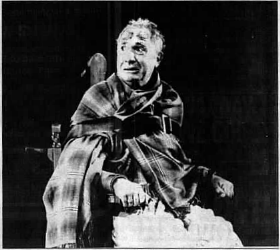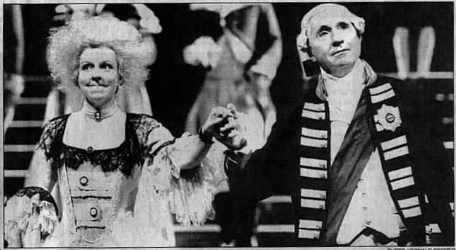












Nigel Hawthorne retakes the colonies
by Kevin Kelly, The Boston Sunday Globe, October 24th, 1993

In The Madness of
George III, he
comes into the
inheritance of
Olivier,
Richardson and
Gielgud.
We're all familiar with the highly motivated, deeply self-centered British actor who ("straight-away") knew he wanted to be in theater from the time he was 2. Shining in the eyes of Mum and Dad, he was taken to pantomimes and children's plays when he was still sucking pacifiers. Which led to opera, ballet and drama. Which led to study - usually at the Royal Academy of Dramatic Art - with Mum and Dad applauding in the wings. Sometimes the motivation and support paid off. Sometimes not.
Guided neither by inner spirit nor by family approval (forget the shine), Nigel Hawthorne struggled for a quarter of a century to find a place in the theater. He then struggled for another 15 years before earning the kind of recognition that led him to the title role in The Madness of George III, which is booked Nov. 2-14 at the Colonial. His startling performance in Alan Bennett's play suddenly has stamped him as the indisputable heir to Olivier, Richardson and Gielgud. At 64, Hawthorne is more than a little dismayed to find himself the hot new British actor who, in addition to playing 18th-century royalty on stage, can currently be seen on screen as the evil Dr. Raymond Cocteau in Sly Stallone's Demolition Man. His dismay simmers with sweet irony rather than resentment. The lesson learned from his Sisyphean early years is to swallow pride and push on. A laser beam may leak into Hades, crack the boulder, show the way out.
"I really ran away in 1951 from South Africa, where I lived with my mother and father - who was a doctor - to come back to England to find myself, then hide what I found," Hawthorne said during an interview this week from Baltimore, the third stop on a limited nine-week, four-city tour of George III. (Part of the reason for the brevity of the run is the tour de force requirements of the lead role.) "I had no financial support from my parents, but, I suppose, I did have moral support - although they really didn't know what was going on. I look back on my mother's letters - she wrote every week - and, well, I always thought of them as giving me moral support, but that wasn't her intent, I don't think. My parents never really understood my choice of career."
In fact, Hawthorne's father expected Nigel to follow his own hospital footsteps. In 1932, Dr. Hawthorne had moved his wife and four children from Coventry to practice medicine in South Africa. But doctoring was not to continue in the family tradition, a tradition that included art on his mother's side (his grandmother was a professional artist) and, on his father's side, either the clergy or medicine.
"But, no, there was no theater. My father played music. That was the nearest I got to having that in my bones. So I have no idea where the idea of acting came from - I mean, other than as a means for me to escape, to hide. Yes, precisely, I mean to hide. From myself. To hide from me, me! Acting gives me the opportunity to be fascinating on stage or, I suppose, properly speaking, pretend to be fascinating. I think 'me' is rather dull. I can be very witty on the stage, I can do all the things I can't do as 'me.' If it takes a bit of work to make people amused, well that suits me just fine, and it seems that people find me fascinating, looking up from the stalls that is. The danger here, of course, is that they won't find me fascinating off-stage, but, then oh dear, that's who I am."
Hawthorne has proved so fascinating to New York drama critics that he won the 1990-'91 Tony Award for his performance as C.S. Lewis in Shadowlands, which told the Kleenex love story of Lewis and Joy Davidman, who was played by Jane Alexander. (A television script expanded into a two-act disease-of-the-month play, Shadowlands tracked the Lewis-Davidman liaison through its termination by cancer.) Prior to that, Hawthorne's years of rejection had him turned down by directors great and small.
Repeated auditions for the Royal Shakespeare Company proved so futile that, as he once said, he began to feel "like a Woody Allen character - people just looked through me." But he never gave up, the reason having less to do with stubbornness, discipline or dedication than "with hiding so deeply" within himself that it was someone else standing on the lip of the stage in scalding light who was being dismissed. Significantly, the actors he admired most were Alistair Sim and Ralph Richardson: "precisely because they were, you know, lost there was an absurdity to them in their given situations," an absurdity Hawthorne suggests - without saying so - not unlike his own, back when he was being buffeted in the theater world. (He never met Sim but he did play opposite Richardson in John Osborne's West of Suez.)
During those hard early years Hawthorne did win the approval of Joan Littlewood, who ran The Theatre Workshop/Theatre Royal Stratford in London. Littlewood understood his hesitancy, his quirkiness; she gave him advice and cast him in three plays, including her legendary production of Oh! What a Lovely War. His first real break came in 1978 as Major Flack in Privates on Parade, which the Royal Shakespeare Company staged at the Aldwych in the West End. The attention he drew in the West End resulted in his being cast by the BBC in a widely popular TV series, "Yes, Prime Minister," which made him a household name in the UK and won him a handful of awards. He has palyed Falstaff, Macbeth, Touchstone and Brutus, as well as leads in new plays by Tom Stoppard, Christopher Hampton and Michael Frayn. His performance as "mad" George III - "the king who lost the colonies" - won him the 1991 Laurence Olivier Award, the London equivalent of the Tony. (Hawthorne may be the only actor whose mantle holds both honors from the same year.)
The Madness of George III - an exhausting role!

"You see, King George III wasn't really mad at all. He kept telling people he was nervous, that was all, that he wasn't insane. But he was diagnosed with porphyria, something not medically understood at the time. He was treated for insanity, but it's subsequently been proved that he was ill, not insane. When Alan Bennett wrote the play, he based it on porphyria," a metabolic disease that often causes behavioral symptoms that can be misinterpreted as insanity. "And now it's been pretty much proved that the diagnosis was jumped on by two doctors who took tiny incidents in teh medical report - one of which had to do with the king's blue urine - and blew them out o proportion. The two doctors were simply quick-off-the-gun.
"It's an exhausting role - 39 costume changes. So all the time I'm not on stage I'm whizzing into something else. There are 26 characters in the play; some of the actors double up. But the exhausting thing isn't playing the 'madness.' It's the energy required to keep all the other performances going. George is central. And his illness goes through stages of deterioration, then recovery - all of which has to be shown dramatically. I'm busy, very busy. I don't look like George III at all. He's become an amalgam of characters in my life. My father first, because I saw him when he had had a few strokes, very ill, incontinent, all those things described in the play. My father's illness made a vivid impression of great horror on me: what I saw, the way he walked, everything, everything. And it's all part of George on stage. And there's a certain amount of Alistair Sim and Ralph Richardson.

"When you come down to it, I suppose it's really all me, what I've become. The layers of influence. What has happened going through life. All those people, experiences, corners, dark places that have left their mark. When you get a part as enormously rich as George, it gives you license to extend yoru horizons, to find out how far you can take it. Why, sometimes, I even feel fascinating off-stage," Nigel Hawthorne said, coughing a soft, shy laugh, then adding as a modest afterthought, "at least to myself!"
